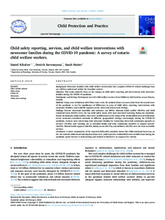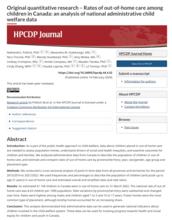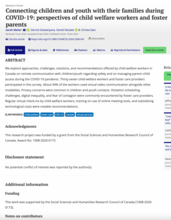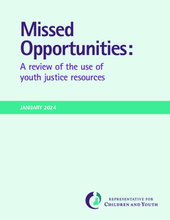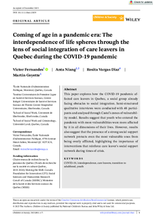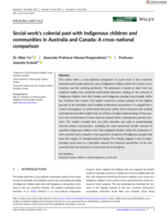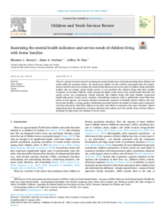Displaying 11 - 20 of 345
This study based in Canada explored views on the changes in child safety reporting and interventions with newcomer families during the COVID-19 pandemic.
The authors analyzed administrative data from Canada to describe the population of children in out-of-home care, and estimate and compare rates of out-of-home care by province/territory, year, sex/gender, age group and placement type.
The authors explore approaches, challenges, solutions, and recommendations offered by child welfare workers in Canada on remote communication with children/youth regarding safety and on managing parent–child access during the COVID-19 pandemic.
The Canadian Government's Representative for Children & Youth released this report on youth justice resources which reveals a misuse of government funds to operate surplus youth justice services.
This paper explores how the COVID-19 pandemic affected care leavers in Quebec, a social group already facing obstacles to social integration.
On 21st September 2023, the Governments of Canada and Zambia, in partnership with UNFPA-UNICEF Global Programme to End Child Marriage and the Child Marriage Monitoring Mechanism, hosted a High-Level Side Event during the Seventy-Eighth Session of the United Nations General Assembly. The event was titled 'Charting Brighter Futures: Utilizing Data for Accelerated Action to End Child Marriage and Achieve SDG 5.3'.
This article offers a cross-national comparison of social work in two countries, Australia and Canada, about the care of Indigenous children within the context of colonization and the evolving profession.
First Nations child welfare advocates are urging the province to bring in Indigenous oversight following the 2021 death of an 11-year-old boy and the abuse of his eight-year-old sister while in foster care.
This study utilized a large sample of treatment-seeking children across Ontario to compare children living with a foster family to non-foster children, across a number of psychosocial, care needs, and demographic variables.
The Nunavut government placed eight children under child services care in three unlicensed group homes in Airdrie, Alta., over the last year.

